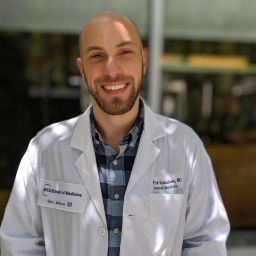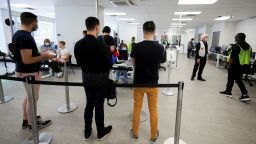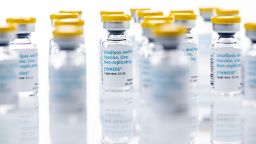Editor’s Note: Lala Tanmoy (Tom) Das is an MD-PhD student at Weill Cornell Medicine in New York City. Follow him @TanmoyDasLala. Eric Kutscher MD is an internal medicine physician and addiction medicine fellow at NYU Langone Health. Follow him @ekutscher. The opinions expressed in this commentary are solely those of the authors. View more opinion on CNN.
As monkeypox cases have skyrocketed in the US, predominantly among men who have sex with men, the stigma associated with it has also grown – including in the medical community.


A recent CNN investigation found that in the midst of rising case numbers, some phlebotomists in the US have refused to draw blood from patients with suspected monkeypox, preventing these patients from obtaining medically necessary and physician-ordered tests.
Yet the definition of “suspected monkeypox” and the other details around these cases remain murky at best. As CNN noted in its reporting, it is unclear if the phlebotomists refused to perform blood draws, or whether company policy prohibited it. Are these encounters in which gay men are being denied bloodwork simply because they are gay and monkeypox is now associated with this demographic? Or are these situations in which patients with visible and infectious pustules are presenting to diagnostic testing sites where phlebotomists are worried about whether proper safety policies and procedures are in place?
In the first encounter, homophobia is the driving factor; in the second, any reasonable health care provider would similarly have reservations about putting themselves at risk. (Even though the US Centers for Disease Control and Prevention suggests that virus levels in infected people’s blood are low, non-bloodborne transmission routes such as directly touching lesions may increase a health care worker’s possible risk of getting infected without adequate PPE.)
We are gay men, and seeing those in our community denied medical care echoes the early days of the HIV/AIDS epidemic. Originally called GRID (gay related immunodeficiency), the outbreak resulted in discrimination and stigmatization of LGBTQ+ individuals across society regardless of infectious status.
It is discriminatory to assume that an identity is itself a risk factor for disease and that avoidance of complete segments of society is an appropriate safety mechanism. Yet these faulty assumptions remain the cornerstone of homophobia in modern day medicine and account for much of the mistrust that LGBTQ+ people have toward the health care system.
But as medical professionals, we also understand the fear that comes with encountering patients who have highly infectious diseases. Eric has been a frontline physician since day one of the Covid-19 pandemic and is now a physician working with patients with monkeypox. Tom has worked with patients in the intensive care unit during the Delta Covid-19 surge. We understand the real fear of contracting viruses at work, and – as a married couple – we recognize the concern about bringing disease home to loved ones.
With the Covid-19 pandemic, we watched as guidelines on PPE changed out of convenience rather than out of scientific data and saw our coworkers – fellow doctors, nurses, phlebotomists, radiology technicians, janitorial staff, security – contract the virus from their patients.
No one goes into medicine to hurt patients – everyone in health care has decided to work in an industry that tries to improve the lives of others. Yet, it would be unconscionable to expect everyone in health care to put their own health at risk to help their patients. And coming off of the Covid-19 experience, there is justified mistrust and persistent fear among many health care personnel.
The way to ameliorate the situation at large – both to bolster the health and safety of health care workers and to address the stigmas associated with monkeypox – is twofold: education and proper safety policies including the provision of personal protective equipment.
Health care providers at all levels must be included in trainings about what monkeypox is, how it is spread (and how it isn’t) and mechanisms to keep themselves safe while caring for all patients – both those with monkeypox and those without. We must make it clear what safety procedures are necessary and ensure all providers have access to materials like PPE at all times.
We must allow each health care worker the chance to ask questions about how monkeypox impacts their job. As a medical community, we will more than likely identify lapses in our policies and ways to improve them.
Feeling protected is a key motivator for behavior change. We’ve seen the evolution in how we’ve interacted with, treated and dealt with HIV through the rise of universal precautions, aimed to protect health care workers. These precautions were introduced by the CDC in the 1980s in response to the HIV epidemic when a lot was unknown about the virus, and they include protocols for hand hygiene; wearing gloves, goggles and gowns; and specific transmission-route based precautions.
If followed properly, they can prevent the transmission of bloodborne pathogens and other infectious materials. The availability of pre-exposure prophylaxis, post-exposure prophylaxis and HIV treatment have even further decreased the fear around infection with HIV among health care providers.
Additionally, vaccines to prevent monkeypox, like Jynneos, are hard to find and must first go to patients at highest risk of disease. The CDC advises people who are exposed to monkeypox through their jobs, such as clinical laboratory personnel who perform diagnostic tests, to get the vaccine as a pre-exposure prophylaxis, and some health care workers who were exposed to patients with monkeypox have gotten the vaccine as a post-exposure prophylaxis to prevent illness or mitigate symptoms. But supplies are still low, and once the vaccines are more readily available, they should be offered as a pre-exposure prophylaxis to a broader range of health care workers, from nurses to hospital staff to technicians – all of whom may encounter patients with monkeypox.
Labcorp executive Dr. Brian Caveney told CNN last week that some of their phlebotomists “have been scared” of monkeypox. Without specific information on what exactly is driving these phlebotomists to refuse blood draws, shaming health care workers for being afraid (despite potentially lacking PPE and updated information on monkeypox) or assuming that it stems exclusively from homophobia, feels a little myopic. As case numbers are projected to climb and the future of the monkeypox outbreak remains uncertain, careful messaging, knowledge sharing and destigmatizing should be our collective priority.
Health care workers must feel heard and protected, as many of us are exhausted, fearful and burnt out from working nonstop through more than two years of the Covid-19 pandemic. But that cannot mean we overlook the needs of our gay, bisexual, queer and transgender patients – an already stigmatized group jaded from decades of minority stress. Institutional and public health strategies must make everyone – patients and providers alike – feel safe and welcome.


